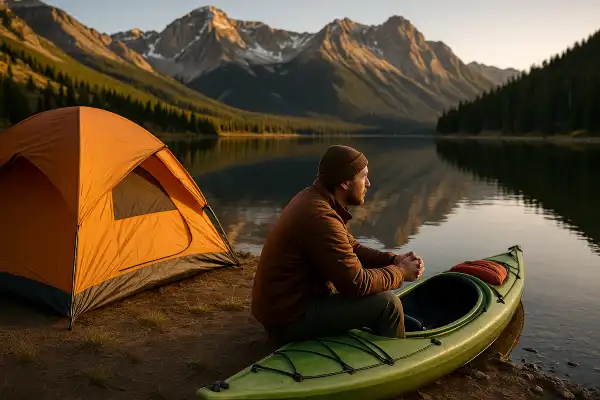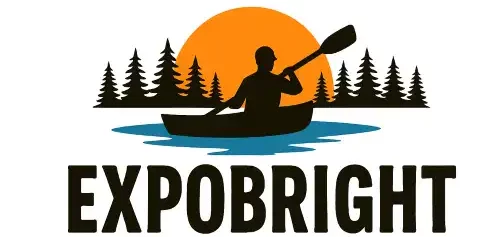Where can you kayak camp in Colorado? This question surfaces frequently among paddlers drawn to the Centennial State’s stunning combination of mountain lakes, rushing rivers, and vast reservoirs. Colorado’s diverse waterways create perfect opportunities for extended paddling adventures that blend the serenity of kayaking with the adventure of wilderness camping.
Having guided countless paddlers through Colorado’s waters over the past decade, I’ve discovered that the state offers some of the most spectacular kayak camping experiences in the country. From multi-day river journeys through ancient canyons to peaceful lake camping beneath towering peaks, Colorado delivers paddling adventures that satisfy every skill level and camping preference.
Where can you kayak camp in Colorado?
Colorado offers exceptional kayak camping opportunities across its 152-mile Arkansas Headwaters Recreation Area, massive reservoirs like Blue Mesa and Navajo, and numerous state parks with dedicated camping facilities. The state caters to both whitewater paddlers seeking adrenaline-pumping river adventures and calm-water enthusiasts looking for serene lake experiences.

Arkansas Headwaters Recreation Area
The Arkansas Headwaters Recreation Area spans 152 miles of the Arkansas River and is recognized as one of the nation’s most popular whitewater rafting and kayaking locations. This expansive area offers both developed campgrounds at locations like Ruby Mountain, Hecla Junction, Salida East, Point Barr, and Rincon, plus dispersed camping opportunities throughout the recreation area.
Ruby Mountain stands out as one of the most popular campgrounds for private boaters, offering excellent river access and several trails leading into the backcountry. The campground provides an ideal base for multi-day kayaking expeditions, with easy access to Browns Canyon National Monument’s spectacular whitewater runs.
For those seeking a more remote experience, dispersed camping is available at popular locations including Granite Rock, Stone Cabin, Rapid Number 4, The Wall, Boulderfield, Elephant Rock, and numerous other riverside spots. These primitive camping areas allow paddlers to establish base camps directly along the Arkansas River, perfect for multi-day expeditions.
Blue Mesa Reservoir
Blue Mesa Reservoir, the largest body of water entirely in Colorado, offers 96 miles of shoreline within the Curecanti National Recreation Area. Elk Creek Campground sits on the north shore of this massive reservoir, providing both basic camping sites and electric hookups for RVs.
The campground offers scenic views in a lightly wooded area where anglers can work Elk Creek for brown and rainbow trout, while swimming, boating, kayaking, and windsurfing remain popular activities. Campsite fees range from $12 per night for basic sites to $18 per night for sites with hookups.
For those preferring free camping, dispersed campgrounds can be found on nearby US Forest Service or BLM land, with great spots available at Soap Creek Road, Red Creek Road, and Hartman Rocks.
Navajo State Park
Navajo State Park, located 35 miles southwest of Pagosa Springs, features a 35-mile-long reservoir that stretches south into New Mexico, offering 15,000 surface acres of paddling opportunities. Park staff recommends the Colorado side of the reservoir for fewer crowds, where kayakers can explore alongside various other boaters while taking in sprawling views.
The park provides year-round camping opportunities, making it an excellent destination for kayak camping expeditions in southern Colorado. Wildlife enthusiasts will appreciate the park’s migratory birds, mule deer, river otters, and bald eagles, while the reservoir itself supports excellent fishing for multiple species.
Shadow Mountain Lake
Shadow Mountain Lake, part of the Arapaho National Recreation Area, offers 1,346 surface acres and 8 miles of shoreline, with camping available at the adjacent campground featuring 80 campsites. This lake connects to Grand Lake via a canal and sits right against Rocky Mountain National Park, providing paddlers with spectacular mountain scenery.
The elevation and mountain setting create ideal conditions for those seeking alpine lake kayak camping experiences. Primary recreational activities include camping, fishing, and power boating, with brown trout, rainbow trout, and salmon as the primary sport fish.
Colorado River State Park
The Colorado River State Park offers multiple sections with camping opportunities, picnicking areas, and gentle paddling sections perfect for family-friendly kayak camping adventures. Many sections feature day-trip options taking a couple of hours with minimal rapids, while more adventurous spots offer easy Class II whitewater.
The James M. Robb Colorado River State Park includes five sections, with Corn Lake, Connected Lakes, and Fruita offering boat launches specifically for kayaks. These areas provide excellent access points for extended paddling and camping trips along Colorado’s famous river.
Mountain Lake Options
Rifle Gap State Park features a long, narrow 350-acre reservoir with crystal clear waters and gorgeous mountain backdrops, while Pearl Lake State Park, nestled north of Steamboat Springs, includes 166 acres of water at 8,065 feet elevation. Both locations offer camping facilities that complement kayaking adventures.
Sylvan Lake makes for a perfect short camping trip where paddlers can combine kayaking with hiking in a secluded alpine setting surrounded by thick trees. Harvey Gap may be smaller than other locations, but offers stunning turquoise waters without large motorboats, creating extremely peaceful paddling conditions.
Permit and Regulation Considerations
Colorado considers kayaks and canoes as vessels without motors, meaning they’re exempt from registration requirements. All kayaks must carry one Coast Guard-approved personal flotation device for each person, and children under 13 must wear them at all times.
State park camping requires reservations and daily entrance fees of $10-11 in addition to camping fees, unless you have a valid annual pass. There’s a 14-day maximum stay allowed per park during any 28-day period.
Conclusion
Last summer, I guided a family of four on their first kayak camping expedition to Blue Mesa Reservoir. Despite their initial nervousness about combining paddling with overnight camping, they discovered the magic that happens when you slow down enough to truly experience Colorado’s waterways. We paddled into a secluded cove as the sun set behind the surrounding peaks, set up camp on a small peninsula, and spent the evening watching stars reflect off the still water.
Following a well-planned guide makes the difference between a stressful outdoor experience and a transformative one. Colorado has great kayak camping opportunities that should absolutely be considered if your timeline allows. Whether you choose the whitewater excitement of the Arkansas River or the serene beauty of a mountain lake, Colorado’s kayak camping destinations offer adventures that create lifelong memories for paddlers willing to embrace the overnight experience.
